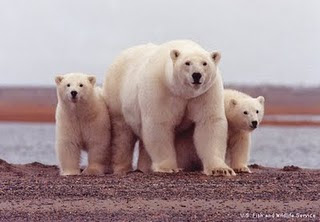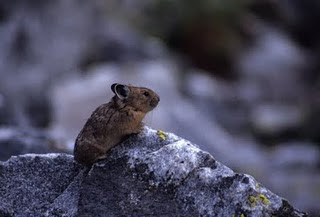By Mitch Merry
Coalition Member Organizer
Endangered Species Coalition
The U.S. Geological Service (USGS) announced this week that they would undertake a series of studies to examine the effects climate change is having and will continue to have on wildlife and their habitats. The research is to include projects in the Great Lakes, San Francisco, Alaska and Florida. This news comes roughly 6 months after USFWS announced their proposed Climate Change Strategy, focused on adaptation, threat mitigation and engagement with private and public agencies.
The research projects are to be carried out through the National Climate Change and Wildlife Science Center with funding provided by Congress through the Energy Independence and Security Act of 2007.
The 17 projects include a wide variety of subjects. Region and state specific computer modeling will be used to predict habitat and species population changes based on rainfall, land cover change and Great Lakes water and temperature level. USGS scientists are tracking snowshoe hares and will use that data to determine what evolutionary changes they may incur to adapt to decreasing amounts of snow. Scientists will also study the impacts of melting Alaska glaciers on coastal ecosystems and the effects dryer conditions will have on plants and the species they support in the Southwest. They’ve selected five priority studies:
- Climate Change as a Challenge to Bird Conservation in Arid and Semi-arid Regions
This study will focus on the changes expected to wetland and riparian habitats and how that will influence the survival of migratory birds. The results will help DOI, FWS and other agencies to develop management plans to protect migratory birds and their habitats.
- Fate of Endangered Species in San Francisco Bay Tidal Marshes with Sea Level Rise
The USGS will evaluate tidal marsh distribution to assist USFWS in making mitigation plans for species such as the salt marsh harvest mosut and California clapper trail.
- Impact of Stream Temperature and Flow Changes on Endangered Atlantic Salmon
This study will measure flow and stream temperature changes in the northeast to gauge the effects climate change is having on an Atlantic-salmon habitat and population. This information will then be used to estimate salmon survival in the future and create an Atlantic Salmon population survival model.
- Potential Influence of Changing Climate on the Persistence of Native Salmonids at Risk
The USGS, US Forest Service, and Trout Unlimited will study how climate change will alter the freshwater habitats of important native fish species such as trout, char and grayling.
- Quantifying the Influence of Climate Change on Rocky Mountain Ungulates
The ecology of hoofed big-game species in the northern Rocky Mountains, known as ungulates, is strongly influenced by climate. This study will examine how changes wrought by climate change such as decreased snow pack, early spring conditions, and increased drought may effect elk, moose and pronghorn antelope. Influences on migrations routes, feed ground use and associated disease prevalence and changes to the amount of vegetation will also be measured.

ESC has recently published a report titled America’s Hottest Species outlining the threats faced by ten species in a warming world. Additionally, we covered the effects of climate change on several species in a recent blog series. Climate change has already led to local population loss in pika, disastrously mistimed migrations by migratory birds, and a particularly dire Presidential prognosis for the polar bear.
With depressingly little action agreed to by the world’s leaders in Copenhagen last December, there needs to be a renewed focus on helping species adapt to the changes in their habitats. This illustrates the need for the US Senate to pass a strong climate bill that includes provisions for wildlife adaptation as well as a carbon cap as a means to fund them.
The President campaigned on a pledge to “implement an economy-wide cap-and-trade program to reduce greenhouse gas emissions 80 percent by 2050.” He needs to be held to this pledge.
Yesterday’s disappointing White House announcement on offshore drilling needs to be balanced by a strong climate bill. The House acted, now the Senate needs to deliver. We need to ensure the President receives a bill that includes science based emissions targets, preserves environmental protections and safeguards species. Contact your Senators today and ask them to pass the climate bill. You can send a letter to your Senator by going here and you can reach the United States Capitol switchboard at (202) 224-312




0 comments on “US to Study Ways to Save Species in a Warming World”